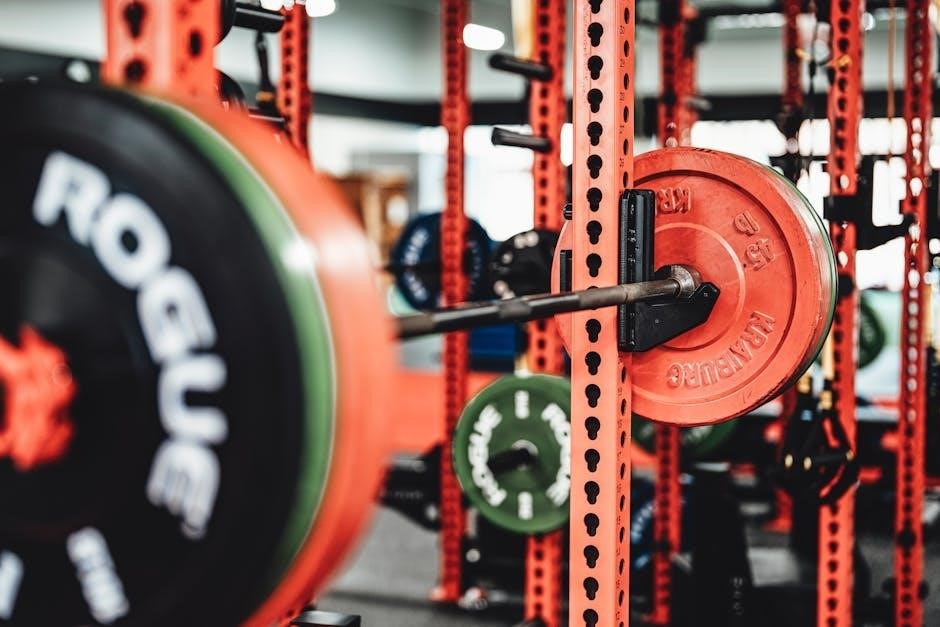Bench press programs are structured training plans designed to improve strength and technique․ They often include variations like 6-week‚ 8-week‚ or 12-week schedules‚ focusing on progressive overload and recovery․ These programs‚ available in PDF formats‚ provide detailed exercises‚ sets‚ and rep ranges to maximize bench press performance․ They cater to different fitness levels‚ ensuring a systematic approach to achieving strength goals․
1․1 What Are Bench Press Programs?
Bench press programs are structured training routines designed to enhance strength‚ technique‚ and muscle development․ They typically include detailed workout schedules‚ exercises‚ and progression strategies․ Available in PDF formats‚ these programs cater to various fitness levels‚ from beginners to advanced lifters․ They often outline specific exercises‚ sets‚ reps‚ and weights to follow‚ ensuring a systematic approach to improving bench press performance․ Whether focusing on strength‚ hypertrophy‚ or competition prep‚ bench press programs provide a clear roadmap for achieving training goals effectively․
1․2 Benefits of a Structured Program
A structured bench press program offers numerous benefits‚ including progressive overload‚ preventing plateaus‚ and ensuring consistent strength gains․ These plans provide clear guidance‚ helping lifters stay focused and motivated․ By following a well-designed program‚ individuals can optimize their training‚ enhance technique‚ and reduce the risk of injury․ Structured programs also account for recovery and nutrition‚ promoting overall muscle development․ Whether aiming to break personal records or build muscle‚ a structured approach ensures a systematic path to achieving bench press goals effectively and safely․
1․3 Choosing the Right Program
Selecting the appropriate bench press program depends on your current strength level‚ goals‚ and experience․ Beginners may benefit from a 6-week program focusing on foundational strength‚ while advanced lifters might opt for an 8-week specialization or 12-week advanced plan․ Consider programs that include progressive overload‚ varied exercises‚ and recovery strategies․ Assessing your one-rep max and adjusting weights accordingly ensures a personalized approach․ PDF guides often provide structured routines‚ making it easier to follow and track progress․ Choose a program aligned with your objectives to maximize results and stay motivated throughout the training cycle․

Types of Bench Press Programs
Bench press programs vary‚ including full-body‚ upper-body focused‚ periodization‚ and specialization plans․ They range from 6 to 12 weeks‚ offering structured routines for progressive strength gains․
2․1 Full-Body vs․ Upper-Body Focused Programs
Full-body bench press programs integrate exercises targeting all major muscle groups‚ ensuring balanced development․ These plans often include squats‚ deadlifts‚ and overhead presses alongside bench work․ In contrast‚ upper-body focused programs prioritize chest‚ shoulders‚ and triceps‚ with exercises like incline presses and dumbbell work․ Full-body programs suit general fitness‚ while upper-body plans are ideal for those seeking specialized strength․ Both approaches emphasize progressive overload and recovery‚ with PDF guides offering structured routines for achieving specific goals․ Choose based on your training objectives and experience level․

2․2 Periodization in Training
Periodization in bench press training involves structuring workouts into specific cycles to optimize strength gains and prevent plateaus․ These cycles‚ detailed in PDF guides‚ alternate between phases of intensity‚ volume‚ and recovery․ For example‚ a 6-week program might focus on building strength‚ followed by a deload week for recovery․ This strategic approach ensures progressive overload without overtraining․ Periodization plans vary‚ with some emphasizing hypertrophy while others prioritize maximal strength․ By following a well-structured periodized program‚ lifters can achieve consistent progress and avoid injury‚ making it a cornerstone of effective bench press training․
2․3 Specialization Programs
Specialization programs focus intensely on improving the bench press‚ often involving two dedicated pressing days per week․ These plans‚ detailed in PDF guides‚ incorporate variations like close-grip benching and reverse benching to target specific muscles․ The 8-week specialization program‚ for example‚ includes progressive overload and deload weeks to enhance recovery․ Designed for advanced lifters‚ these programs aim to break plateaus and boost one-rep max significantly․ They are ideal for those seeking focused‚ results-driven training‚ ensuring consistent strength gains through tailored exercises and structured progression․
Designing Your Bench Press Program
Designing a bench press program involves assessing strength levels‚ setting realistic goals‚ and implementing progressive overload․ Structured plans‚ often in PDF formats‚ guide lifters through tailored exercises and schedules to maximize gains efficiently․
3․1 Assessing Current Strength Levels

Assessing current strength levels is crucial for creating an effective bench press program․ Start by determining your one-rep max (1RM)‚ which is the maximum weight you can lift in one repetition․ This can be done using a bench press calculator or through a series of tests․ Knowing your 1RM allows you to set realistic goals and design a program that progressively increases the weight․ Many PDF guides‚ such as the Candito 6-Week Powerlifting Program‚ provide structured assessments to help lifters accurately gauge their strength․ Accurate assessment ensures a safe and efficient training process․

3․2 Setting Realistic Goals
Setting realistic goals is essential for a successful bench press program․ Aim to increase your one-rep max (1RM) by 10-15% over 6-8 weeks․ For example‚ if your current 1RM is 200 pounds‚ target 220-230 pounds․ Break your goals into smaller milestones‚ such as adding 5 pounds weekly․ Use structured plans like the 6-week or 12-week bench press programs found in PDF guides to track progress․ Avoid overambitious targets to prevent injury or burnout․ Periodization and progressive overload are key to achieving sustainable gains․ Clearly defined goals will keep you motivated and focused throughout your training journey․
3․3 Understanding Progressive Overload
Progressive overload is the cornerstone of any effective bench press program․ It involves gradually increasing the weight‚ volume‚ or intensity over time to challenge muscles and stimulate growth․ A common approach is to add 2․5-5% to your bench press max every 4-6 weeks․ For example‚ if you bench press 200 pounds‚ aim to lift 210 pounds in six weeks․ This principle ensures continuous progress and prevents plateaus․ Use a bench press program PDF to track your lifts and apply overload systematically․ Consistency and patience are key to long-term strength gains․

Sample Workout Routines
Sample workout routines provide structured plans for increasing bench press strength․ They include 6-week‚ 8-week‚ and 12-week programs with specific exercises‚ sets‚ and reps․ These routines‚ often found in PDF guides‚ cater to different goals‚ such as strength‚ hypertrophy‚ or competition prep‚ ensuring a clear path to achieving bench press success․
4․1 6-Week Bench Press Program
The 6-week bench press program is a focused plan designed to boost strength and technique․ It typically involves two training days per week‚ with Day 1 emphasizing the bench press and incline dumbbell presses‚ and Day 2 targeting the bench press alongside overhead presses․ The program progressively increases the weight lifted over time‚ ensuring continuous improvement․ Each week builds on the previous one‚ incorporating variations like close-grip benching and reverse benching to target different muscle groups․ The goal is to enhance overall bench press performance by the end of the sixth week‚ with a final max test to measure progress․
4․2 8-Week Specialization Program
The 8-week bench press specialization program is an intense‚ focused plan designed to maximize strength gains․ It features two pressing workouts per week‚ targeting the bench press and complementary exercises like overhead presses and incline dumbbell work․ The program incorporates progressive overload‚ with weights increasing gradually to challenge the lifter․ By the end of week 8‚ participants perform a conservative RPE 9-9 1RM test to assess progress․ This structured approach ensures consistent improvement and is ideal for those looking to break plateaus or achieve new personal bests․ Detailed PDF guides are available for tracking and execution․
4․3 12-Week Advanced Program
The 12-week advanced bench press program is tailored for experienced lifters seeking significant strength gains․ It combines heavy bench presses with variations like close-grip benching and reverse benching to target different muscle groups․ The program also incorporates accessory exercises such as dips and dumbbell presses to enhance overall upper-body strength․ With a focus on progressive overload‚ it gradually increases intensity to break plateaus and build serious strength․ Detailed PDF guides are available‚ outlining each phase‚ ensuring a structured approach to achieving a higher 1RM and maximizing results by the end of the program․
Nutrition and Recovery
Nutrition and recovery are crucial for strength gains․ A balanced diet rich in protein‚ carbs‚ and fats supports muscle growth․ Adequate sleep and hydration enhance recovery‚ preventing overtraining․
5․1 Role of Nutrition in Strength Gains
Nutrition plays a vital role in maximizing strength gains․ A calorie-surplus diet with adequate protein‚ carbohydrates‚ and fats is essential․ Protein supports muscle repair and growth‚ while carbohydrates provide energy for workouts․ Healthy fats aid in hormone production․ Hydration is also critical for recovery․ A well-structured meal plan ensures the body has the necessary fuel to adapt to the demands of bench press training‚ promoting progressive overload and strength improvements․ Proper nutrition complements training‚ helping athletes achieve their bench press goals effectively․
5․2 Importance of Recovery Techniques
Recovery is crucial for muscle repair and strength gains․ Techniques like rest‚ sleep‚ and stretching help reduce muscle soreness and improve joint health․ Foam rolling and hydration also support recovery․ Adequate sleep ensures hormonal balance‚ aiding muscle growth․ Inadequate recovery can lead to fatigue and decreased performance․ Incorporating recovery techniques into your routine enhances muscle repair‚ preventing overtraining and injury․ Proper recovery strategies maximize the effectiveness of your bench press program‚ ensuring progressive overload and consistent strength improvements over time․
5․3 Sleep and Its Impact on Strength
Sleep plays a vital role in strength gains‚ as it supports muscle recovery and hormonal balance․ During sleep‚ hormones like testosterone and growth hormone are released‚ essential for muscle repair and growth․ Poor sleep quality can hinder recovery‚ reducing strength and performance․ Aim for 7-9 hours of sleep nightly to optimize recovery․ Additionally‚ sleep deprivation increases the risk of injury and decreases training adaptability․ Prioritizing sleep ensures your body can handle the demands of your bench press program‚ making it a cornerstone of effective training and strength progression․
Bench press programs are effective for building strength and muscle․ Consistency‚ proper form‚ and progressive overload are key․ Results vary‚ but dedication ensures progress and improved performance․
6․1 Summarizing Key Points
Bench press programs offer structured training plans to enhance strength and technique․ Key elements include progressive overload‚ recovery‚ and proper form․ Programs vary in duration‚ such as 6-week‚ 8-week‚ or 12-week plans‚ catering to different fitness levels․ They often incorporate exercises like close-grip benching‚ incline presses‚ and accessory work to target specific muscle groups․ Nutrition and sleep play crucial roles in maximizing gains․ Consistency and adherence to the program are essential for achieving desired results․ These plans provide a systematic approach to improving bench press performance‚ ensuring steady progress and avoiding plateaus․
6․2 Final Tips for Success
Consistency and patience are key to maximizing bench press gains․ Track progress weekly and adjust routines as needed․ Prioritize proper form to prevent injuries and ensure efficient strength gains․ Incorporate accessory exercises to target weak points and enhance overall performance․ Stay committed to your program‚ and avoid overtraining‚ as recovery is crucial for growth․ Utilize resources like PDF guides for structured plans and motivation․ Focus on progressive overload and celebrate small victories to stay motivated․ With dedication and the right strategy‚ achieving a stronger bench press is within reach․

6․3 Encouragement to Start
Embarking on a bench press program is an exciting and rewarding journey․ Whether you’re a beginner or an experienced lifter‚ structured plans like those found in PDF guides can help you achieve your goals․ Remember‚ every rep and set contributes to progress․ Stay consistent‚ trust the process‚ and celebrate small victories along the way․ With patience and dedication‚ you’ll build strength and confidence․ Don’t hesitate to start—your journey to a stronger bench press begins now․ Let the motivation of seeing improvements drive you forward and enjoy the transformative results that come with consistent effort․